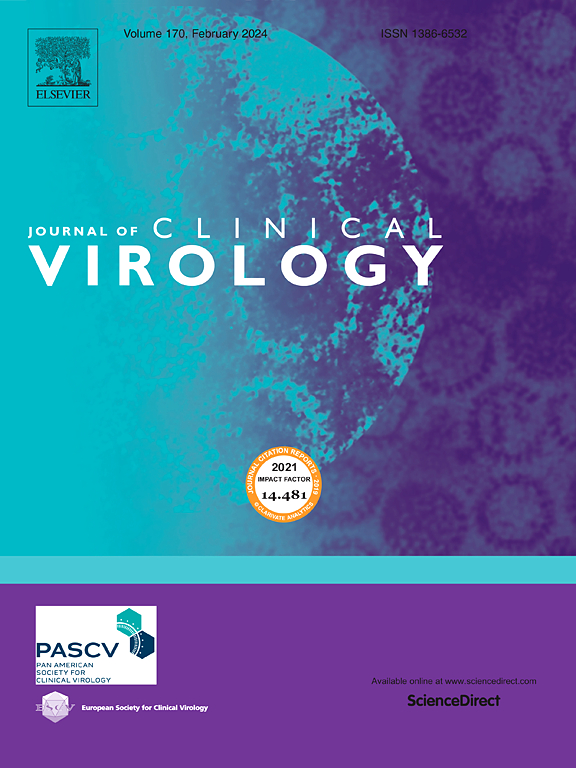Evaluation of molecular detection for respiratory syncytial viruses in World Health Organization Europe region laboratories, 2020–2023
IF 3.4
3区 医学
Q2 VIROLOGY
引用次数: 0
Abstract
Background
Respiratory syncytial virus (RSV) is a common pathogen causing mostly mild-symptoms, but in young infants and elderly individuals it can lead to severe disease and death. After the SARS-CoV-2 pandemic, more focus on and testing of patients with respiratory symptoms occurred, which led to an increase in RSV detections. Also, newly developed vaccines and prophylactic and therapeutic antibodies against RSV have been approved for use, increasing attention on the need for quality RSV diagnostics.
Objectives
The goal of this study was a broad analysis of the external quality assessment (EQA) data for RSV using data from Quality Control for Molecular Diagnostics (QCMD).
Results
Using the QCMD data, performance of NAATs for detecting RSV was evaluated on an average of 67 laboratories per year, in an average of 21 countries across the WHO Europe region. The results of these EQAs show that the performance of laboratories for RSV molecular diagnostics in the WHO Europe region is good; overall correct scores for core samples between 96.8 % and 99.2 % for RSV-A and between 96.0 % and 100 % for RSV-B for the years 2020–2023. For the years 2020–2023, more tests were performed using commercial assays (63.5–82.0 %) than in-house assays (18.0–36.5 %).
Conclusions
Based on analysis of data from the QCMD RSV EQA program during the years 2020–2023, we conclude molecular diagnostics for RSV in laboratories from WHO Europe region are being performed with high-quality. However, with increases in testing, numerous diagnostic assays being used by laboratories, and possible viral changes to newly introduced vaccines and prophylactic/therapeutic antibodies, continued quality assessment of RSV diagnostics is recommended.
2020-2023年世界卫生组织欧洲区域实验室呼吸道合胞病毒分子检测评价
呼吸道合胞病毒(RSV)是一种常见的病原体,主要引起轻微症状,但在幼儿和老年人中可导致严重疾病和死亡。SARS-CoV-2大流行后,更多地关注和检测有呼吸道症状的患者,导致RSV检测增加。此外,新开发的针对RSV的疫苗和预防性和治疗性抗体已被批准使用,这增加了对高质量RSV诊断需求的关注。目的本研究的目的是利用分子诊断质量控制(QCMD)的数据对RSV的外部质量评估(EQA)数据进行广泛分析。结果利用QCMD数据,在世卫组织欧洲区域平均21个国家平均每年67个实验室对NAATs检测RSV的性能进行了评估。这些环境质量评价结果表明,世卫组织欧洲区域RSV分子诊断实验室的表现良好;2020-2023年,核心样本的RSV-A总体正确率在96.8%至99.2%之间,RSV-B总体正确率在96.0%至100%之间。在2020-2023年,使用商业测定法(63.5% - 82.0%)比内部测定法(18.0 - 36.5%)进行更多的检测。基于对2020-2023年QCMD RSV EQA项目数据的分析,我们得出结论:世卫组织欧洲区域实验室RSV分子诊断正在高质量地进行。然而,随着检测的增加,实验室使用了许多诊断分析方法,以及新引入的疫苗和预防性/治疗性抗体可能发生病毒变化,建议继续对RSV诊断进行质量评估。
本文章由计算机程序翻译,如有差异,请以英文原文为准。
求助全文
约1分钟内获得全文
求助全文
来源期刊

Journal of Clinical Virology
医学-病毒学
CiteScore
22.70
自引率
1.10%
发文量
149
审稿时长
24 days
期刊介绍:
The Journal of Clinical Virology, an esteemed international publication, serves as the official journal for both the Pan American Society for Clinical Virology and The European Society for Clinical Virology. Dedicated to advancing the understanding of human virology in clinical settings, the Journal of Clinical Virology focuses on disseminating research papers and reviews pertaining to the clinical aspects of virology. Its scope encompasses articles discussing diagnostic methodologies and virus-induced clinical conditions, with an emphasis on practicality and relevance to clinical practice.
The journal publishes on topics that include:
• new diagnostic technologies
• nucleic acid amplification and serologic testing
• targeted and metagenomic next-generation sequencing
• emerging pandemic viral threats
• respiratory viruses
• transplant viruses
• chronic viral infections
• cancer-associated viruses
• gastrointestinal viruses
• central nervous system viruses
• one health (excludes animal health)
 求助内容:
求助内容: 应助结果提醒方式:
应助结果提醒方式:


